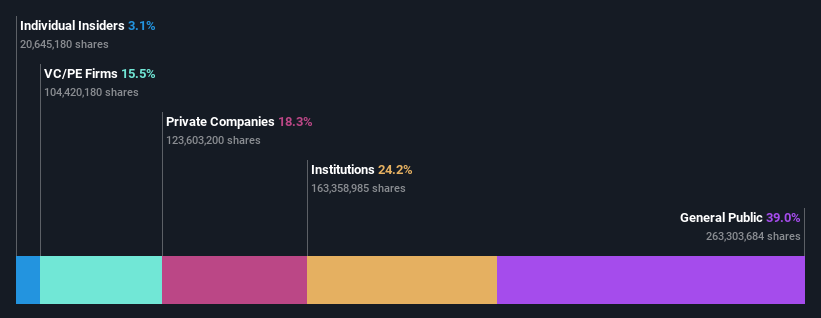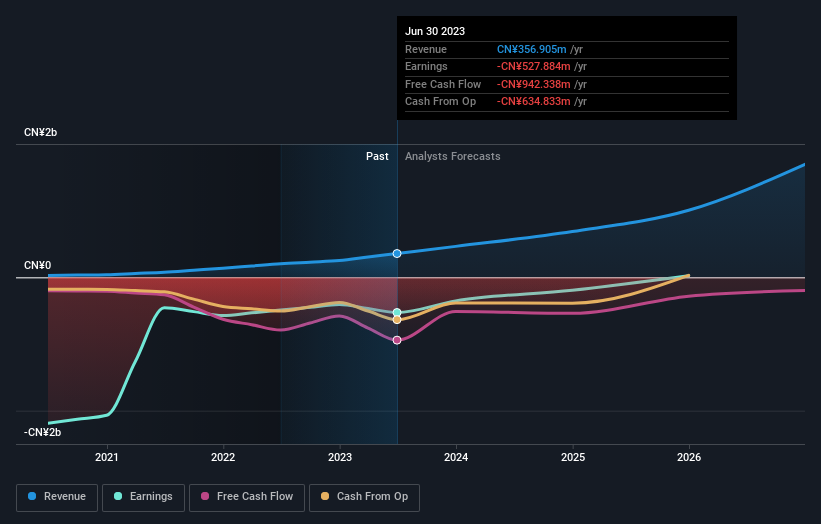- Hong Kong
- /
- Medical Equipment
- /
- SEHK:9996
Peijia Medical Limited's (HKG:9996) 10% loss last week hit both individual investors who own 39% as well as institutions

Key Insights
- Significant control over Peijia Medical by retail investors implies that the general public has more power to influence management and governance-related decisions
- 51% of the business is held by the top 10 shareholders
- Institutional ownership in Peijia Medical is 24%
A look at the shareholders of Peijia Medical Limited (HKG:9996) can tell us which group is most powerful. With 39% stake, retail investors possess the maximum shares in the company. That is, the group stands to benefit the most if the stock rises (or lose the most if there is a downturn).
Following a 10% decrease in the stock price last week, retail investors suffered the most losses, but institutions who own 24% stock also took a hit.
Let's take a closer look to see what the different types of shareholders can tell us about Peijia Medical.
See our latest analysis for Peijia Medical

What Does The Institutional Ownership Tell Us About Peijia Medical?
Institutions typically measure themselves against a benchmark when reporting to their own investors, so they often become more enthusiastic about a stock once it's included in a major index. We would expect most companies to have some institutions on the register, especially if they are growing.
Peijia Medical already has institutions on the share registry. Indeed, they own a respectable stake in the company. This implies the analysts working for those institutions have looked at the stock and they like it. But just like anyone else, they could be wrong. When multiple institutions own a stock, there's always a risk that they are in a 'crowded trade'. When such a trade goes wrong, multiple parties may compete to sell stock fast. This risk is higher in a company without a history of growth. You can see Peijia Medical's historic earnings and revenue below, but keep in mind there's always more to the story.

Hedge funds don't have many shares in Peijia Medical. XinYue International Limited is currently the largest shareholder, with 13% of shares outstanding. For context, the second largest shareholder holds about 9.4% of the shares outstanding, followed by an ownership of 6.0% by the third-largest shareholder. In addition, we found that Yi Zhang, the CEO has 0.8% of the shares allocated to their name.
We did some more digging and found that 10 of the top shareholders account for roughly 51% of the register, implying that along with larger shareholders, there are a few smaller shareholders, thereby balancing out each others interests somewhat.
While it makes sense to study institutional ownership data for a company, it also makes sense to study analyst sentiments to know which way the wind is blowing. There are a reasonable number of analysts covering the stock, so it might be useful to find out their aggregate view on the future.
Insider Ownership Of Peijia Medical
The definition of company insiders can be subjective and does vary between jurisdictions. Our data reflects individual insiders, capturing board members at the very least. The company management answer to the board and the latter should represent the interests of shareholders. Notably, sometimes top-level managers are on the board themselves.
Most consider insider ownership a positive because it can indicate the board is well aligned with other shareholders. However, on some occasions too much power is concentrated within this group.
Shareholders would probably be interested to learn that insiders own shares in Peijia Medical Limited. In their own names, insiders own HK$95m worth of stock in the HK$3.1b company. Some would say this shows alignment of interests between shareholders and the board. But it might be worth checking if those insiders have been selling.
General Public Ownership
The general public, who are usually individual investors, hold a 39% stake in Peijia Medical. This size of ownership, while considerable, may not be enough to change company policy if the decision is not in sync with other large shareholders.
Private Equity Ownership
Private equity firms hold a 15% stake in Peijia Medical. This suggests they can be influential in key policy decisions. Some investors might be encouraged by this, since private equity are sometimes able to encourage strategies that help the market see the value in the company. Alternatively, those holders might be exiting the investment after taking it public.
Private Company Ownership
Our data indicates that Private Companies hold 18%, of the company's shares. It might be worth looking deeper into this. If related parties, such as insiders, have an interest in one of these private companies, that should be disclosed in the annual report. Private companies may also have a strategic interest in the company.
Next Steps:
I find it very interesting to look at who exactly owns a company. But to truly gain insight, we need to consider other information, too. Consider risks, for instance. Every company has them, and we've spotted 1 warning sign for Peijia Medical you should know about.
If you are like me, you may want to think about whether this company will grow or shrink. Luckily, you can check this free report showing analyst forecasts for its future.
NB: Figures in this article are calculated using data from the last twelve months, which refer to the 12-month period ending on the last date of the month the financial statement is dated. This may not be consistent with full year annual report figures.
New: Manage All Your Stock Portfolios in One Place
We've created the ultimate portfolio companion for stock investors, and it's free.
• Connect an unlimited number of Portfolios and see your total in one currency
• Be alerted to new Warning Signs or Risks via email or mobile
• Track the Fair Value of your stocks
Have feedback on this article? Concerned about the content? Get in touch with us directly. Alternatively, email editorial-team (at) simplywallst.com.
This article by Simply Wall St is general in nature. We provide commentary based on historical data and analyst forecasts only using an unbiased methodology and our articles are not intended to be financial advice. It does not constitute a recommendation to buy or sell any stock, and does not take account of your objectives, or your financial situation. We aim to bring you long-term focused analysis driven by fundamental data. Note that our analysis may not factor in the latest price-sensitive company announcements or qualitative material. Simply Wall St has no position in any stocks mentioned.
About SEHK:9996
Peijia Medical
Engages in the research and development of transcatheter valve therapeutic and neuro interventional procedural medical devices.
Excellent balance sheet and good value.

